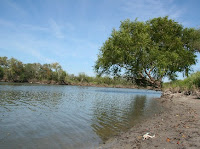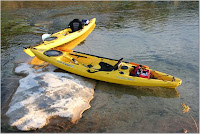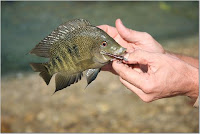Nuts for the Nueces
 Driving south from San Antonio on Interstate Highway 37, the first hint of the city of Corpus Christi is the gleaming profusion of refineries off in the distance: scaffolding and gas flares, storage tanks and distillation towers. At night, the lights look like a cityscape in their own right.
Driving south from San Antonio on Interstate Highway 37, the first hint of the city of Corpus Christi is the gleaming profusion of refineries off in the distance: scaffolding and gas flares, storage tanks and distillation towers. At night, the lights look like a cityscape in their own right.The refineries exist because of the Port of Corpus Christi -- the nation's sixth-busiest -- and the port exists because of the Nueces River.
Shortly after the refineries come into view, the interstate crosses the river. Here it is a slow, silt-laden stream crawling between muddy banks choked with mesquite, willow and scrubby oaks. Just downstream, the river meanders into spartina marsh before emptying into the shallow, reef-strewn reaches of Nueces Bay.
That's the Nueces I grew up with.
 It is a distinctly different river some 300 miles upstream at the western edge of the Edwards Plateau. Uvalde, about 50 miles from the river's headwaters and a good four-hour drive from Corpus, is the only other town on the entire river with a population above three digits, and it boasts only around 17,000 souls.
It is a distinctly different river some 300 miles upstream at the western edge of the Edwards Plateau. Uvalde, about 50 miles from the river's headwaters and a good four-hour drive from Corpus, is the only other town on the entire river with a population above three digits, and it boasts only around 17,000 souls.Last weekend, with four friends, I set out to explore that difference, and the river that has long been calling to me.
 Marc McCord, writing for SouthwestPaddler.com, reports that: "The spring-fed, crystal clear water flows through the limestone bluffs of the Edwards Plateau, and is one of the most scenic river trips in Texas."
Marc McCord, writing for SouthwestPaddler.com, reports that: "The spring-fed, crystal clear water flows through the limestone bluffs of the Edwards Plateau, and is one of the most scenic river trips in Texas."McCord also reports that some 45 miles of the upper Nueces, from north of Barksdale to near Uvalde, are navigable nearly year-round.
Not so, said Marilyn Stoner. Marilyn and her husband Tom own Clear Creek Outfitters in Camp Wood. From the paddling shop-and-antique store on the main drag, they rent kayaks, provide shuttles and counsel kayakers on current river flows and conditions. The advice and help with route planning is free to all comers.
 "There is a lot of outdated information on the Internet," Marilyn told me when we stopped in Friday. "I don't recognize some of the things I read about the Nueces. This river changes all the time."
"There is a lot of outdated information on the Internet," Marilyn told me when we stopped in Friday. "I don't recognize some of the things I read about the Nueces. This river changes all the time."Marilyn warned us that the river is shallow in many places and we'd probably end up dragging the boats part of the way.
"There are rocks in some of those rapids that will eat boats," she said.
 Of course, the same is true of most Hill Country streams. The classic pool-and-drop configuration of these spring-fed rivers, with the hard, limestone bedrock of the Edwards Plateau, mandate carrying a strap or line with which to pull boats and decent footwear for the portions the paddler will be forced to walk in ankle-deep water.
Of course, the same is true of most Hill Country streams. The classic pool-and-drop configuration of these spring-fed rivers, with the hard, limestone bedrock of the Edwards Plateau, mandate carrying a strap or line with which to pull boats and decent footwear for the portions the paddler will be forced to walk in ankle-deep water.On the Nueces, even more than some other Hill Country streams, rises can come quickly. The river's watershed is huge -- it drains something like 17,000 square miles -- and a downpour out of sight and sound beyond a ridgeline can translate into a sudden wall of water under bright sun and blue skies somewhere else minutes or hours later.
 To my surprise, I found the portions of the Nueces we paddled -- at what Marilyn and Tom said is average or just below-average flows -- to be more easily navigated than most Hill Country streams farther east.
To my surprise, I found the portions of the Nueces we paddled -- at what Marilyn and Tom said is average or just below-average flows -- to be more easily navigated than most Hill Country streams farther east.On one six-mile reach I was forced out of my boat exactly once, and then only because I chose the wrong channel at the head of a riffle.
 There are few legal camping spots along the river bed, and an even smaller number of comfortable ones. But with frequent county road crossings between Camp Wood and Uvalde, daytrips with overnights in one of several private campgrounds in the area is a good strategy.
There are few legal camping spots along the river bed, and an even smaller number of comfortable ones. But with frequent county road crossings between Camp Wood and Uvalde, daytrips with overnights in one of several private campgrounds in the area is a good strategy.We chose Big Oak campground just south of Camp Wood, where tent camping sites include water, electricity, fire rings and grills.
 A trip like this isn't all about the paddling, after all, or fishing, for that matter.
A trip like this isn't all about the paddling, after all, or fishing, for that matter.It's also about leaving workaday concerns behind. It's about the joy of watching a belted kingfisher hover above a riffle, dive and emerge with a minnow in its beak. It's about the play of light and water and limestone, and a flock of wild turkeys coming down to drink.
It's about good friends and good food and the lies guys tell around the campfire.
Vince (an old college buddy of like mind who I'm just now really getting to know) brought venison fajita meat -- and his Big Bend staple, Easy Cheese (I'm now a convert); Ken, my regular coastal paddling partner, provided a flask of apfelkorn. Danny -- my fishing partner of more than decade -- and Schu, another Houston friend, kept busy passing icey cans of Pearl Light around the fire.
 After a full day of paddling -- and with well over 100 fish caught between us -- Saturday was an early night. After coffee and campfire eggs and sausage in the morning, we decided to break camp and enjoy the scenery on the way home rather than attempt the three-hour paddle we had planned for farther downstream.
After a full day of paddling -- and with well over 100 fish caught between us -- Saturday was an early night. After coffee and campfire eggs and sausage in the morning, we decided to break camp and enjoy the scenery on the way home rather than attempt the three-hour paddle we had planned for farther downstream.For Vince and me, that meant heading 20-plus miles cross-country from Barksdale on an unpaved county road that wound through large ranches along the canyon carved by Bullhead Creek. That road connected to Ranch Road 336, which plunges south to Leakey.
 From Leakey, it was left on my old friend FM 337 through Vanderpool and down to Medina.
From Leakey, it was left on my old friend FM 337 through Vanderpool and down to Medina.Between Leakey and Vanderpool, Vince and I pulled off at a picnic area high atop a ridge to stretch our legs and grab a quick bite to eat. As we carved chunks of venison sausage onto saltines liberally spread with Easy Cheese, we heard a voice: "Good job! You're doing great! Just a little farther now ...."
We turned to see a young boy -- probably only 9 or 10 -- coast to a stop on his bicycle. Behind him came a man on a triple-seater, two younger children behind him.
 I was amazed they had all pedaled up the hill we would soon coast down in my truck. Iwas even more amazed when the man told me they had come all the way from Medina, and their destination that evening was Camp Wood.
I was amazed they had all pedaled up the hill we would soon coast down in my truck. Iwas even more amazed when the man told me they had come all the way from Medina, and their destination that evening was Camp Wood.A Team Cyclone support trailer pulled in a few minutes later, so I guess they probably knew what they were doing. But still. Wow.
 Closer to home, a quick stop at a top-secret fossil hunting site yielded the most numerous and perfect clam casts I have yet seen, as well as a handful of fossilized sea urchins. Family obligations kept us from lingering long, but we plan to take the kids back Saturday.
Closer to home, a quick stop at a top-secret fossil hunting site yielded the most numerous and perfect clam casts I have yet seen, as well as a handful of fossilized sea urchins. Family obligations kept us from lingering long, but we plan to take the kids back Saturday.It's a fine coincidence that Sunday is one of two "Fossil ID Days" UT hosts each year. Look for a report on that expedition here after the weekend.
[The Nueces at LaBonte Park, alongside IH-37 just north of Corpus Christi. Note the dead crab in the foreground; still life with boats on the Nueces River near Big Oak River Camp; this view of Ken's right foot gives a pretty good idea of both the water depth and quality in the upper Nueces (photo courtesy KendalLarsonPhotography.com); Schu and Danny negotiate a snag in a tight bend on the upper Nueces below Camp Wood; A nice Rio Grande perch, the only cichlid native to Texas; Danny, Ken and Vince show-off a largemouth bass triple-header; Vince admires a nice Nueces River Guadalupe bass; Ken goes for broke with the Easy Cheese; sitting around the campfire; You never know what you might see on the roads through the Hill Country. Here, two camels kiss; Five tired but happy bikers at the top of the ridge between Vanderpool and Leakey ; even if you don't paddle, or fish, the trip to Camp Wood is worth it for the amazing scenery. We figure the more warning signs, the better the drive (photo courtesy Vince Terracina, TAG Marketing).]

2 comments:
Nice report! I grew up in Mathis, with the Nueces just a few miles to our south. We spent many afternoons splashing around and fishing on the muddy river below the dam. I recently stopped at the river crossing on Hwy 90 just west of Uvalde. It was beautiful. Hardly can belive it's the same river! (p.s. got your blog URL from Vince on the Big Bend Chat site)
Yeah, it's way different, isn't it? Thanks for stopping by!
Post a Comment